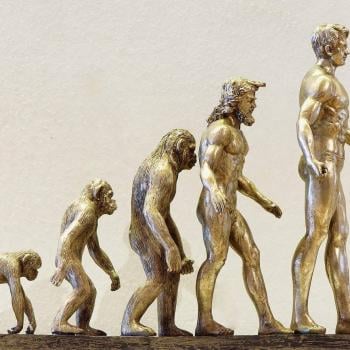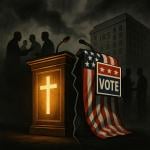THE QUESTION:
Why do 21st Century Christians favor, or oppose, same-sex marriage?
THE GUY’S ANSWER:
Just before Christmas, a top Trump-loving conservative on New York City talk radio professed disbelief that some Americans persist in opposing same-sex marriage because of some book (unnamed) written ages ago. So The Guy again realizes that journalism has important work to do explaining the basics on Christian thinking, both con and pro.
The teaching against gay and lesbian relationships stood essentially unquestioned for 2,000 years but that’s now changing. Still, on the global level some 2 billion people belong to Catholic, Orthodox, conservative Protestant, and Independent indigenous churches where there’s no prospect of any major change, though individual members dissent. (The same for a billion Muslims.)
In the U.S., the traditionalists are on defense with gay and lesbian marriage legalized by the Supreme Court and now Congress. They seek recognition by courts and government agencies of their conscience claims, hope to avoid penalties, and worry that ostracism from polite society may lie ahead.
Many “mainline” Protestant churches in North America and Western Europe recently enacted historic breaks with tradition, approving same-sex marriages for clergy and parishioners. U.S. landmarks: Change was first formally proposed to Presbyterians in 1968 and the United Methodist Church in 1972. E.L.C.A. Lutherans published four major books advocating change between 1983 and 1999. The Episcopal Church consecrated its first openly gay bishop in 2003, splitting Anglicans internationally. Among resulting walkouts, the biggest may be the Methodist one currently erupting.
Protestant disputes always center on the Bible. In the following, The Guy used the updated New Revised Standard Version Bible, and sources that include the useful “Homosexuality and the Bible: Two Views,” co-authored by the late Dan O. Via, a liberal, and conservative Robert A.J. Gagnon.
Conservatives like Gagnon have written extensively but their case boils down to this: The Bible’s aversion to same-sex behavior is clear and must be honored. But Via explained that fellow liberals don’t necessarily take Scripture “at face value.” Their “experiential or existential view” says a Bible passage carries authority for an individual when seen as “engaging and compelling,” by providing “grounding and meaning to existence.”
Bible Texts “do not necessarily mean what they say,” Via contended, and interpreters must consider the ancient context, modern social science, gay experience, and biblical principles like justice, equity, and love of neighbor. Thus instead of moral decision-making based on “acts and rules,” Christians should consider “consequences, intentions, and inner dispositions.”
The Old Testament’s Leviticus 18:22 commands, “You shall not lie with a male as with a woman; it is an abomination.” Exegetes like Via see this as part of a Jewish “holiness code” whose ritual purity tenets no longer apply for Christians. Conservatives like Gagnon respond this may be true for other biblical passages but this one addresses sexual practices, including adultery, incest and bestiality, which all branches of Christianity reject to this day.
In the New Testament, I Corinthians 6:9 says “wrongdoers will not inherit the kingdom of God,” including “the sexually immoral, idolaters, adulterers, male prostitutes, men who engage in illicit sex,” with a New RSV footnote that the meaning of Paul’s last two Greek words is “uncertain.” But evangelicals’ New International Version reads “men who have sex with men,” with a footnote citing scholars who say the two words “refer to the passive and active participants in homosexual acts.”
However experts understand that verse (or 1 Timothy 1:10, or Jude 7), both sides agree the key is Paul’s Letter to the Romans 1:26-27. In discussing rejection of God’s truth, he denounces those overtaken by “dishonorable passions. Their females exchanged natural intercourse for unnatural, and in the same way also the males, giving up natural intercourse with females, were consumed with their passionate desires for one another. Males committed shameless acts with males . . .”
Some argue that Paul was assailing only the era’s widespread practice of men exploiting or prostituting boys, often slaves, and argue this does not apply to modern-day adults’ consensual partnerships. Via said though pederasty was indeed widespread, Greco-Roman culture also had consensual adult couples.
Via’s emphasis instead was that Paul, like other ancients, had no concept of “sexual orientation” that may not be a person’s choice, may not be open to reversal, and is fixed early in life whether from biological or psychological causes. He thought gay marriage prevents harmful promiscuity, an argument Paul made for heterosexual marriage (1 Corinthians 7:2,9).
For Via, such “contextual factors” can invalidate sexual rules if a relationship is “loving, consensual, non-manipulative and faithful.” Conservatives like Gagnon say behavioral science has no firm conclusion on causes, and in any event such factors cannot erase what Scripture clearly teaches.
A lesser argument says Jesus never explicitly denounced homosexuality, but he defined marriage as only between one man and one woman in Mark 10:6-9, paralleled in Matthew 19:4-6. Or some say Christianity can eliminate sexual rules just it dropped Old Testament circumcision and kosher laws, but those changes came by direct revelations of God that Christianity believes are scriptural.
On other faiths, a couple points.
Change in Judaism is also rather recent. As late as 1983, a compendium of rulings published by the rabbinate of the liberal Reform branch stated that “there is no question that Scripture considers homosexuality to be a grave sin” and Reform Jews “certainly revere” the Bible’s moral judgments. Thus “so-called” homosexual marriage violates “all that is respected in Jewish life.” Reform later evolved but that is the Orthodox branch’s continued belief.
In Islam, the authoritative Fiqh Council of North America posted a draft fatwa (ruling) against transgenderism last year that reaffirms the “unanimous consensus” against same-sex behavior taught in the Quran and Sharia (religious law), while adding that a gay inclination as such is not sinful. A 2010 fatwa from the council’s leader directed believers not to even associate with committed homosexuals.
On the non-religious debate: Law professor Kenji Yoshino criticized an important defense of traditional marriage in the Harvard Journal of Law & Public Policy, https://slate.com/news-and-politics/2010/12/robert-p-george-s-argument-against-gay-marriage-fails.html/ and its authors responsed here. www.thepublicdiscourse.com/2010/12/2217/












